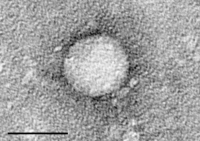
Photo from wikipedia
BACKGROUND Acute hepatitis C virus (AHC) infection is increasingly common among HIV+ men who have sex with men (MSM). Until 2017, the guidelines recommended therapy with pegylated-interferon plus ribavirin with… Click to show full abstract
BACKGROUND Acute hepatitis C virus (AHC) infection is increasingly common among HIV+ men who have sex with men (MSM). Until 2017, the guidelines recommended therapy with pegylated-interferon plus ribavirin with a mild sustained virological response (SVR). This prompted many patients to reject that treatment, at that time, waiting to be treated with better and safer options with new Direct-Acting-Antivirals (DAA). OBJECTIVES Assess the efficacy and safety of Elbasvir/Grazoprevir to treat recent chronic hepatitis C infection, genotype 1 or 4, in HIV+ MSM patients. METHODS Prospective, open-labeled, two center, pilot study. SVR is analyzed for treatment with Elbasvir/Grazoprevir (8 weeks in GT1b or 12 in GT1a or GT4) in patients with a recent chronic HCV infection, defined as HCV infection lasting less than 4 years and mild liver fibrosis (liver stiffness <8kPa). RESULTS Forty-eight patients were included (May 2017-March 2018): 2 GT1b, 24 GT1a and 22 GT4. HCV-RNA>800000UI in 63% and medium liver stiffness 4.9kPa. The SVR was 98%, one patient failed due to poor adherence. 67% of patients had adverse effects, but only 16% treatment related. The most frequent side effects were gastrointestinal (19%), related with the central nervous system (18%), respiratory (16%) and systemic symptoms (15%). During one year of follow-up post-therapy, 4 AHC and 18 patients with sexually transmitted diseases (STD) were diagnosed. CONCLUSIONS Treatment with Elbasvir/Grazoprevir in this scenario is highly effective and safe. Patients with risky sexual practices must remain linked to the medical care system to detect new STD and HCV reinfection.
Journal Title: Gastroenterologia y hepatologia
Year Published: 2020
Link to full text (if available)
Share on Social Media: Sign Up to like & get
recommendations!